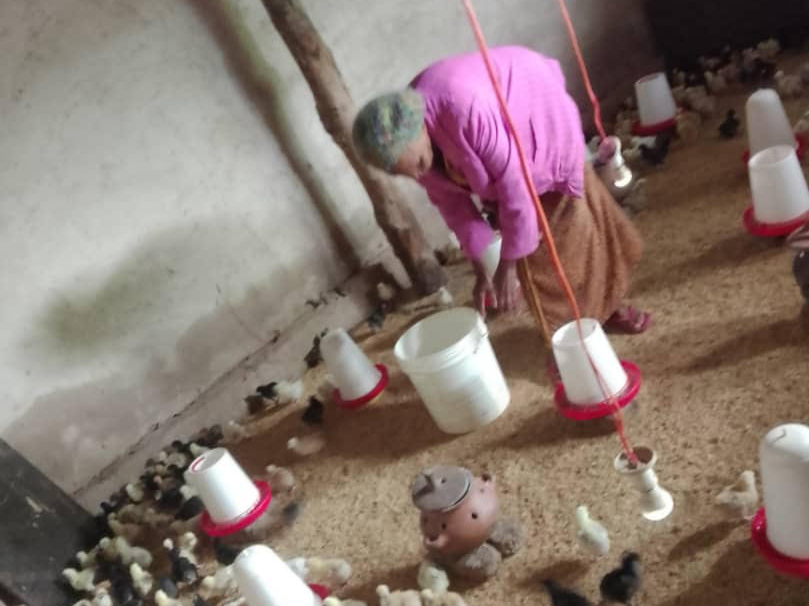In the serene Malolo village, nestled within the Singida District Council, 70-year-old Catherine Kilongo, affectionately known as ‘Bibi kuku’, starts her day with a purpose. As she meticulously cleans her chicken coop and feeds her chicks, she showcases her poultry farming expertise to enthusiastic villagers attending her training class.
Bibi kuku, whose vibrant spirit belies her age, has been a dedicated farmer for nearly a decade. “I opened this training class to share my knowledge with fellow villagers,” she says, demonstrating her commitment to community empowerment.
Her involvement in poultry, fish, and bee farming has been greatly enhanced by training received through the Youth Employment through Skills Enhancement (YES) project. This initiative has not only improved her own farming practices but has also equipped her with the skills necessary to educate others. Her efforts have led to a remarkable increase in the number of poultry farmers in her village, significantly improving livelihoods and enabling families to fund their children’s education.
Bibi kuku reflects on the changing perceptions surrounding farming: “In the past, many viewed farming or livestock rearing as tasks for the uneducated. Now, I see a shift; they recognize opportunities in these activities, unlike before when they were seen as outdated.” This transformation in mindset serves as a testament to the effectiveness of community-based training programs.
In the neighboring Tanzanian capital, Dodoma, a swarming Area C suburb, hosts Herta Fabian who is equally passionate about her work at Kidoti House of Beauty, her thriving beauty salon. Herta is dedicated to ensuring her cosmetology students gain the essential skills necessary to excel in the beauty industry.
Recently, she returned from a specialized training program designed to empower young people with teaching skills, as part of the YES project sponsored by Helvetas Swiss Intercooperation.
Herta’s commitment to professional development has led to significant improvements in her teaching methods. “This training has been incredibly meaningful for me. Initially, I relied on experience alone, but now I am confident in what I do because it is professional. Even our students notice the difference in the quality of training they receive,” she states.
She does not only enjoys beautification activities and event photography but also finds fulfillment in teaching her peers, enabling them to develop skills that address employment challenges.
Abraham Mtongole, YES project manager, emphasizes the initiative’s goal of equipping youth with self-employment skills while enhancing the competencies of artisans who have relied solely on experience.
“Artisans typically acquire their skills through years of hands-on experience, making them excellent practitioners. However, they may lack the teaching experience necessary for guiding youth embarking on their vocational journeys,” he explains.
The pedagogical training provided by the YES project equips artisans with essential tools to structure their lessons, communicate concepts effectively, and create a supportive learning environment. Mtongole notes that many youth trainees, especially those from vulnerable backgrounds, require mentorship that goes beyond technical instruction.
“Pedagogical training introduces artisans to youth-friendly methodologies, gender-sensitive approaches, and principles of positive reinforcement,” he adds. This nurturing environment significantly enhances learner retention and outcomes, creating a more inclusive training atmosphere.
Well prepared artisan trainers play a crucial role in keeping trainees engaged and motivated while offering structured skill development and identifying those who may struggle. This support boosts the confidence and employability of youth, equipping them with meaningful competencies.
Moreover, workplace safety training is integral to the YES project, promoting a culture of safety in vocational training settings that often expose trainees to potential hazards. Artisans learn to integrate safety standards into their training, ensuring both trainers and learners are aware of essential safety practices.
“When trained in workplace safety, we become role models who impart these values to our trainees. This ensures our trainees possess not only technical skills but also a solid understanding of safe working practices, making them more attractive to future employers,” Mtongole points out.
Through initiatives like the YES project, the future of youth in Tanzania appears promising. They gain the skills and knowledge necessary to thrive in their chosen fields while positively contributing to their communities. The inspiring journeys of Bibi kuku and Herta serve as shining examples of how dedicated individuals can foster change, uplift their communities, and create lasting impacts through skill development and education.
Read more artciles by Deus Bugaywa

